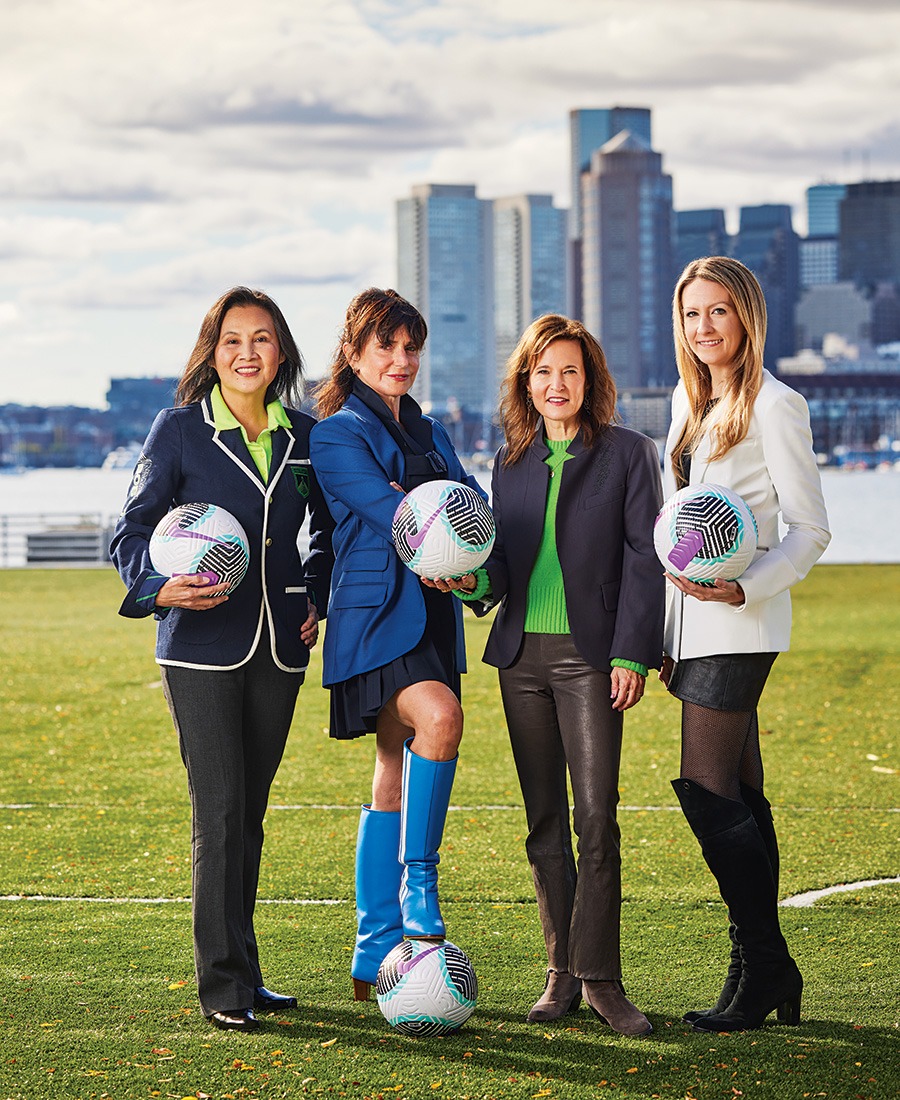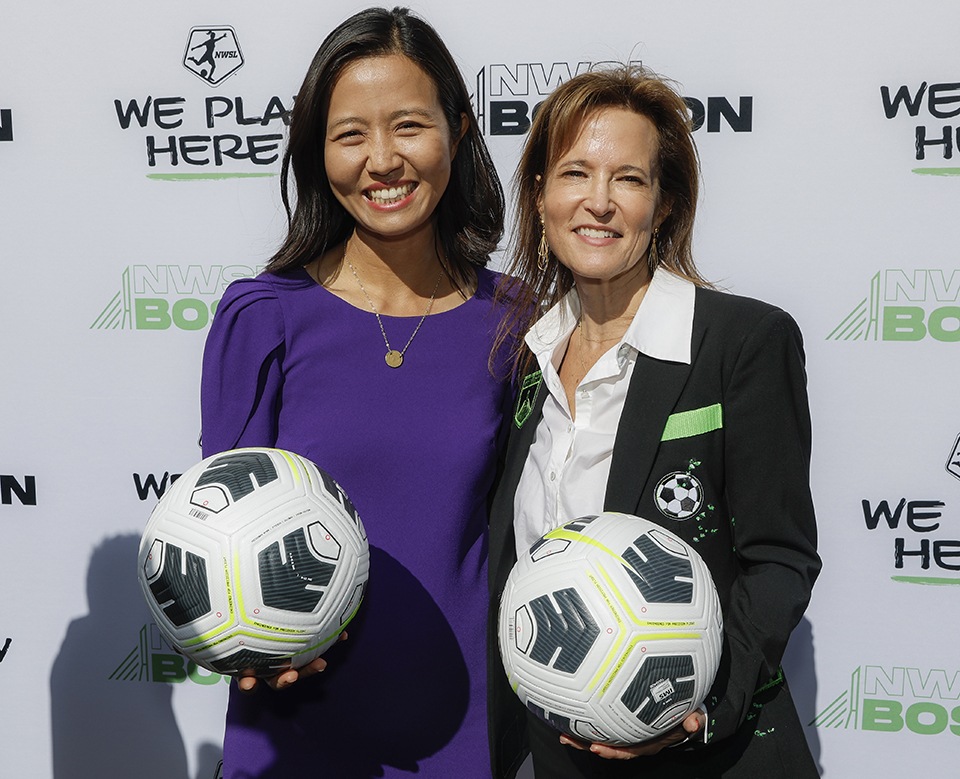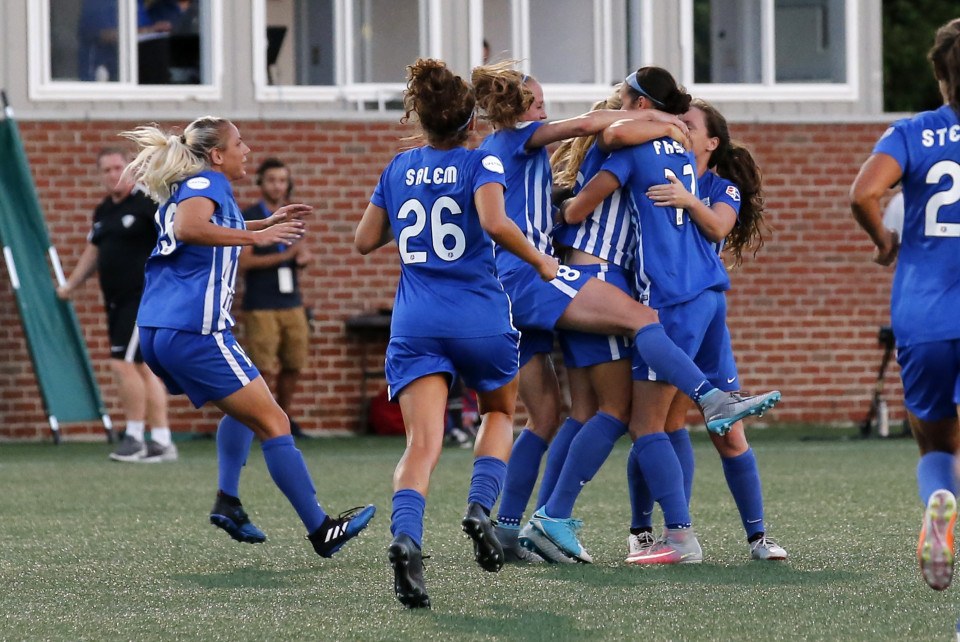Meet the Four Investors Bringing Women’s Soccer to Boston (Again)
This powerhouse group of company-builders and equity champions are behind a new professional sports team in New England. In a first for the region, they also happen to be women.

From left, Boston Unity partners Ami Kuan Danoff, Stephanie Connaughton, Jennifer Epstein, and Anna Palmer. / Photo by Pat Piasecki
No matter how many times we try, or how much we love our hometown teams, Boston has seldom been able to expand its professional sports offerings. Plans for Olympic Games and IndyCar racing came a cropper. Owner Robert Kraft spent years unsuccessfully trying to build a stadium in the city for the New England Revolution. Red Sox owners were stymied when they proposed a new, more spacious and modern ballpark in Southie.
Perhaps it takes a woman to get the job done.
More accurately, several women. In a first for the region—and a rarity in the country—a women-led group of owners will soon own a professional sports team: a yet-to-be-named franchise in the National Women’s Soccer League (NWSL). Their bid to join the league in 2026 has been accepted, and a deal has been inked to play in a renovated 11,000-seat venue in the heart of Boston: Franklin Park’s White Stadium, the premier, though deteriorating, athletic venue for Boston Public Schools.
In the mind’s eye of optimists, come 2026, there will be thousands of diverse, enthusiastic fans from suburbs and city neighborhoods alike gathering to take in some of the best athletic competition in the world in the same place that Boston’s schoolchildren train and compete. That would have a “triangle impact,” says state Senator Liz Miranda, whose district includes White Stadium. “The team has a home, the schools have a home, and soccer has a home.”
It’s the work, primarily, of four power-house women who hastily assembled, somewhat Avengers-like, to form Boston Unity Soccer Partners late in the summer of 2022: Jennifer Epstein, 54, of the South End; Anna Palmer, 38, of Dedham; Stephanie Connaughton, 58, of Chestnut Hill; and Ami Kuan Danoff, 60, of the Back Bay. They and the investors they’ve since added—including Boston Globe Media CEO Linda Pizzuti Henry and Boston Celtics basketball operations president Brad Stevens—will reportedly spend more than $100 million before the team even takes the field, including a $53 million franchise fee to join the league, plus at least $30 million to get White Stadium spit-shined and ready for action.
The avenging, if we use that analogy, is for the loss of the city’s previous NWSL team, the Breakers, which folded after the 2017 season due to financial struggles, poor attendance, and two failed ownership deals. And, perhaps, a little bit for the city’s male-dominated sports history. The four women all believe in “equity in sports” and in the need to provide “the missing piece in the sports landscape here in Boston,” says Epstein, who has taken the lead role in the franchise. “We have these five amazing championship legacy teams”—the Red Sox, Bruins, Celtics, Patriots, and Revolution—“and it’s time to write the story of the next.”

Boston Mayor Michelle Wu with Jennifer Epstein, controlling partner of Boston Unity Soccer Partners, in a September 2024 press conference announcing that a Boston team will join the National Women’s Soccer League. / Photo by Matthew J. Lee/The Boston Globe via Getty Images
The partners’ road to the National Women’s Soccer League began, as many business deals do, totally out of nowhere. In the summer of 2022, Anna Palmer, the first female general partner at Flybridge Capital, sat down with Los Angeles–based venture capitalist Kara Nortman over breakfast. The morning meetup had nothing to do with soccer—or, at least, it wasn’t supposed to.
At one point, though, Nortman, a cofounder of a new Los Angeles–area NWSL franchise, happened to mention that the league was looking to award additional franchises, and Palmer—an avid fan and believer in the growing value of women’s sports—locked onto the topic and wouldn’t let go for the rest of the meal. And beyond. Back in the office, “she was obsessed with the idea,” says Flybridge cofounder Jeff Bussgang. “She’s an entrepreneurial force of nature.”
As luck would have it, Palmer also had a catch-up breakfast the very next day with Juno Equity founder Jennifer Epstein, a previous investor in one of Palmer’s startup businesses and a restaurateur behind the Beehive and Cósmica. As the two were standing up to leave, Palmer mentioned the NWSL opportunity. Epstein—whose family is part of the Celtics ownership group—immediately wanted in. “There are very few ideas that spark the fire quite like this one did,” Epstein says.
Epstein started making phone calls. Among the very first was to Stephanie Connaughton, a Wharton and Harvard alum who has mentored startups for years and previously did marketing at Gillette. The two had previously worked together, and she knew Connaughton could bring her branding expertise to the NWSL project. It took very little convincing. “I don’t even think I thought about it for two minutes,” Connaughton says. “It was a whole-body yes.”
In fact, Connaughton was so enthused that she couldn’t help talking about it while attending a Red Sox game with Ami Kuan Danoff, a former Fidelity equities analyst and Putnam portfolio manager who cofounded the Women’s Foundation of Boston in 2017. “Stephanie talked about it,” Danoff says, “and I said, ‘I’d like in.’”
In just a few months, the core founding team had formed, thanks to previous connections among four local investors, all with the means and startup experience to bring the idea to life. They all happened to be women, in addition to successful company-builders, equity champions, and philanthropists with deep wells of useful (and wealthy) contacts. “We’ve seen a lot of founding teams,” Palmer says, but “it’s fairly rare when you have a group of people come together that instantly mesh so well.”

The Boston Breakers, celebrating here at Boston’s Jordan Field in August 2017, folded due to financial struggles, poor attendance, and two failed ownership deals. / Photo by Fred Kfoury III/Icon Sportswire via Getty Images
In January 2023, not long after the idea of a soccer team first entered Palmer’s head, she and her partners received the news they were hoping for: Boston had been tapped for a potential NWSL expansion team.
There was a snag, though: Before the announcement could be made official, they needed a place to play games. The founding group believed that one reason for the former team’s failure was the lack of a true home stadium. In fact, the Breakers changed venues several times: Harvard Stadium, with more than 30,000 seats, proved too cavernous for the relatively small crowds; Dilboy Stadium in Somerville was too small, with merely 2,500 seats, as was Jordan Field on Soldiers Field Road.
The solution to this Goldilocks-like moveable feast of venues, the Boston Unity founders believed, was obvious: White Stadium, the 10,000-seat facility in the heart of Boston owned by BPS and used for a bevy of school activities and competitions. Mayor Michelle Wu had already made renovating the rundown field, built in 1945, a key part of her Green New Deal for BPS in the spring of 2022. Wu did not, however, have a specific plan for that renovation—or, crucially, a way to pay for it. So when the newfound partners approached the mayor about partnering with the city on the project, Wu was enthusiastic—but wary. After all, two of her recent predecessors, Marty Walsh and Thomas Menino, had tried—and failed—to renovate the stadium. The mayor also had virtually no relationship with the four women who wanted to be involved.
At the same time, the idea of a pro sports team paying for most of a renovation that would benefit city schoolchildren—and the community bordering Franklin Park—was too tempting to pass up. “A big part of this was getting to know the ownership group, understanding their goals, and hearing very firmly that this soccer team is being completely embedded in the community,” Wu says, “and ensuring that the benefits of this team would directly strengthen Boston.”
Wu put several City Hall folks to work on the project, appointing Morgan McDaniel, deputy chief of operations for capital investments, as the lead. Wu also, critically, convinced WilmerHale attorney William Lee to pull together a pro bono team of lawyers to research creative ways to structure a deal that could work for both the team and the city. Still, Wu says, “To be totally honest, I would have put the odds [of coming to an agreement] at maybe 50–50, if that, when we first embarked on this.”
The plan that Lee’s team successfully cooked up calls for a half-and-half arrangement: Boston Unity will spend some $30 million to renovate the west grandstands and expand the capacity to 11,000 seats, outfitting it with all of the facilities a major sports team needs. The team will also pay for annual upkeep of the field itself. The city of Boston will rebuild the fire-damaged east grandstand with new student amenities, including everything from weight training to a sports medicine facility. A new eight-lane running track will, at least in theory, turn Boston into a major host for track-and-field events. And the stadium will continue to be owned by BPS—the first time a professional sports team will play in a facility owned by a public school.
By July, the city and Boston Unity entered the unusual public-private agreement. With a home stadium secured, the NWSL officially announced its selection of Boston over Tampa Bay and other bidders for a coveted franchise.
There are concerns to overcome, of course, specifically from members of the Roxbury, Dorchester, Jamaica Plain, and Mattapan neighborhoods—mostly people of color—whose communities will see increased traffic, parking problems, noise, and other disruptions as up to 11,000 people attend 20 home games a year. In preparation, the Boston Unity team has embarked on a series of community meetings to assuage skepticism and convince residents of the benefits, including an economic boost from fans dining and shopping in the neighborhood.
Community feedback thus far has been evenly split, state Senator Miranda says, between excitement and concern. Transportation issues lead the worry list: Wu has said that “We are not paving over any of this historic Olmsted park for game-day parking,” which means that on-street parking is likely to be flooded on game days even with park-and-ride shuttles and admonitions to use the MBTA.
Still, Miranda says that her constituents are potential customers as much as complainants. “Soccer is a huge cultural sport in African-American and immigrant communities,” she says, noting that the game is popular not just at schools but through organizations such as South End Soccer. Dream Big founder Linda Driscoll, whose organization provides sports equipment and other assistance to economically disadvantaged girls, echoes that sentiment, saying she’s optimistic about the impact of the team and the stadium. “This is going to give back bigtime to the youth of Boston,” Driscoll says. “It would have been so easy for them to plop some fields in the middle of Newton so that all of the suburban families could go to these games.”
Of course, Boston has a long history of wealthy developers promising that their big plans will benefit the community. Skepticism is to be expected. For their part, the Boston Unity founders are at least doing all the right things so far, including Connaughton’s attendance at the first in-person community meeting about the project, focused specifically on transportation. And to say they’re excited about the prospect of bringing women’s soccer to Franklin Park is an understatement. “It’s a global sport, and Boston is a very global city,” Epstein says. “We are going to attract a diverse fan base that reflects the diversity of the population in our city.”
Enthusiasm for the team is already high. In fact, the Boston Unity partners have already started getting stopped in public by potential fans.
Although the founders and their financial backers believe the new team is a lucrative investment, there are plenty of reasons to be skeptical, beyond just where fans are going to park. In fact, the biggest question looming is whether there will be any fans at all.
Before the Breakers stopped playing for good following the 2017 season, the team was drawing only 3,000 fans to its home games, a figure well below the league average at the time, and which today would put them solidly in last place. But a lot has changed since then. Women’s sports have skyrocketed in popularity: In the past couple of years, women’s soccer—along with basketball, tennis, and even volleyball—has repeatedly set and reset records for attendance and viewership. Women’s soccer is also riding a wave of popularity following a record-smashing 2023 FIFA Women’s World Cup. The United States’ second game in the series, for instance, drew an average of 6.4 million viewers, up more than 20 percent from the corresponding match in 2019.
As a result, NWSL franchise values have soared—Boston’s franchise fee, for instance, is 20-plus times what teams were paying to enter the league just a few years ago. A new television deal, currently being negotiated, will bring additional revenue and exposure to the league. And advertisers are more eager than ever to pay for exposure to a young, diverse, active audience: Of the league’s 14 corporate sponsors in the 2022 post-season, four were new that year and four were from the year prior. Bud Light sponsors the postseason; Ally Financial’s logo is on every jersey. Individual teams all have additional jersey sponsors—many have one for the front and another for the sleeve.
It’s all become so promising, in fact, that Nortman—the investor who first mentioned the NWSL opportunity to Palmer over breakfast—has since started a firm, Monarch Collective, dedicated to investing solely in women’s sports. That fund has already raised $140 million, according to Nortman’s partner, Jasmine Robinson. The fund’s very first investment? Boston Unity Soccer Partners. “It became very clear that this was an incredible investment opportunity, and with people we really wanted to partner with,” says Robinson, a former San Francisco 49ers investment manager who was more recently with the Boston-based venture capital firm Causeway.
So will the fervor be even higher in another two years when the Boston franchise finally takes the pitch for the 2026 season? In the time between now and then, Boston Unity is planning to build excitement with a flurry of events and announcements, including the team’s name, logo, coach, player signings, and sponsorship deals. To that end, Epstein has been talking to large financial institutions, while Connaughton and Danoff are in discussions with auto manufacturers and other global corporations. In particular, Danoff says, they are pressing Boston-area companies to step up the way they do for men’s sports teams. “Why is this firm, one that’s right in our backyard, sponsoring this many teams,” she asks, “and yet not a single women’s team?”
The good news is enthusiasm for the team is already high. In fact, the Boston Unity partners have already started getting stopped in public by potential fans: Palmer was flagged down at the Boston Children’s Museum, Epstein at a South End coffee shop. They all hope that positive signs like these mean Bostonians are ready for another sports franchise. For their part, the founders say, they’re gearing up for what could be a wild ride—so long as Boston is.
First published in the print edition of the December 2023/January 2024 issue with the headline, “Bend it Like Boston.”


